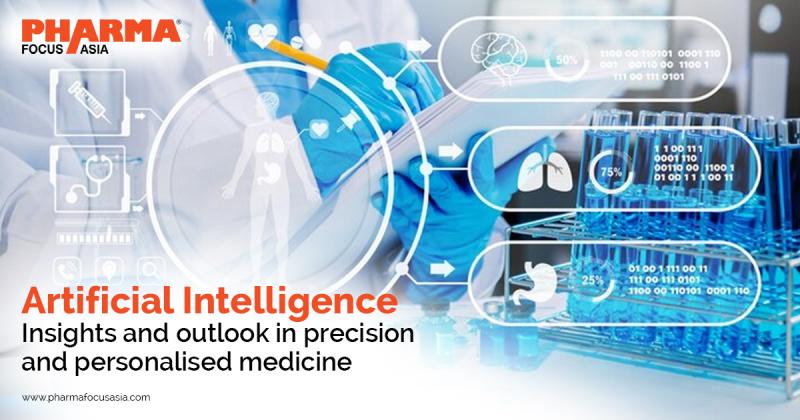Artificial Intelligence Insights and outlook in precision and personalised medicine

The intersection of Artificial Intelligence (AI) and personalised medicine is transforming the landscape of pharmaceutical systems by improving the precision of drug delivery. Precision medicine, which focuses on patient phenotypes with diminished treatment responses, is significantly enhanced by AI's advanced computational models. This integration provides physicians with valuable tools for rapid and improved diagnosis and disease management. In the current landscape, AI is effectively addressing challenges associated with both genomic and nongenomic determinants. It aids in collecting information on disease symptoms, clinical history, and lifestyle factors, thereby facilitating personalised diagnosis and prognostication.

The healthcare industry is undergoing a significant shift towards the adoption of precision medicine. Recent advancements in medical research have led to an increased reliance on big data and precision medicine. This has created a substantial demand for the integration of machine learning (ML) and systems genomics algorithms, working in conjunction with multiomics data, to assess potential phenotype-genotype associations. Differences in responses to specific medications or treatment strategies within a population can be attributed to variant genetic and expression profiles. Computing biology has progressed significantly, enabling the analysis and functional annotation of extensive biological datasets. AI in biology plays a crucial role in identifying patterns between functional annotations, allowing for the construction of a functional hologram from diverse data types. AI has shown promise in augmenting the capabilities of healthcare specialists, offering support in tasks ranging from diagnostics to treatment planning. The use of AI can help mitigate human limitations, such as fatigue and inattention, and address the risks associated with human error in medical decision-making. By leveraging machine learning algorithms and advanced data analysis, AI systems can process vast amounts of medical data quickly and accurately, leading to improved diagnostic accuracy and personalised treatment options. Successful adoption of AI in healthcare relies on three key principles: data and security, analytics and insights, and shared expertise. The importance of data and security lies in establishing full transparency and trust in how AI systems are trained and the information used for their training. As humans and AI increasingly collaborate, trust in the output of these systems becomes essential. It's worth noting that AI is not the sole data-driven field influencing healthcare; precision medicine, with a history of over a decade, holds an equal or even greater impact on the trajectory of healthcare. (Figure 1)

AI and Precision Medicine
The integration of AI and precision medicine is playing a pivotal role in addressing complex challenges within personalised healthcare. A notable application involves genomic considerations in tailoring therapy plans. Patients harbouring pharmacogenomically actionable variants may necessitate adjusted prescription or dosing. The groundbreaking aspect lies in genome-informed prescribing, showcasing the scalability of precision medicine. The real-time effectiveness of recommendations relies on the development of machine-learning algorithms capable of predicting which patients may require medication based on genomic information. This early use case exemplifies the synergy between AI and precision medicine, where AI techniques prove invaluable for efficient and high-throughput genome interpretation. The key to personalising medications and dosages is preemptive genotyping, ensuring the availability of genomic information when needed. Some advantages provides by AI in Precision medicine are
(i) AI analyses large datasets, including genomic information, clinical records, and other relevant data, to identify patterns and correlations. This enables the development of personalised treatment plans tailored to the unique genetic and molecular characteristics of each patient.
(ii) AI accelerates drug discovery by analysing vast datasets to identify potential drug candidates and predict their efficacy. This speeds up the drug development process, reduces costs, and increases the likelihood of finding targeted therapies for specific genetic or molecular profiles.
(iii) AI is instrumental in analysing genomic data to identify genetic variations associated with diseases. This information can be used to understand the genetic basis of diseases, predict susceptibility, and design targeted therapies.
AI and Personalised medicine
Artificial Intelligence (AI) plays a significant role in advancing personalised medicine, a medical approach that tailors healthcare decisions and interventions to individual patient characteristics. Here are some ways in which AI is being utilised in personalised medicine:
1. Data Analysis and Integration
Genomic Data Analysis: AI is used to analyse vast amounts of genomic data to identify genetic variations associated with diseases or drug responses.
Integration of Multi-Omics Data: AI can integrate data from various sources, such as genomics, proteomics, and metabolomics, to provide a comprehensive understanding of an individual's health.
2. Disease Prediction and Diagnosis
Machine Learning Models: AI algorithms can predict disease risk by analysing patient data, family history, and genetic information.
Image Analysis: AI is employed for image-based diagnosis, such as interpreting medical imaging data like MRI, CT scans, and pathology slides to aid in early disease detection.
3. Drug Discovery and Development
Target Identification: AI helps identify potential drug targets by analysing biological data and understanding disease pathways.
Drug Repurposing: AI can identify existing drugs that may be repurposed for new therapeutic uses, accelerating drug development.
Read more: https://www.pharmafocusasia.com/information-technology/artificial-intelligence-insights-and-outlook


Comments